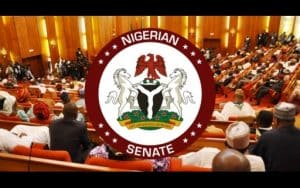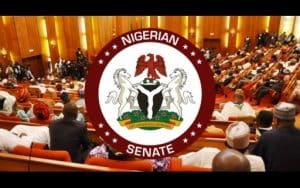Senate Launches Probe Into ‘Alleged Economic Sabotage’ In Nigeria’s Petroleum Sector

The Nigerian Senate has initiated a comprehensive investigation into alleged economic sabotage within the country’s petroleum sector.
This inquiry is led by a 15-member panel chaired by Senate Leader Opeyemi Bamidele (APC, Ekiti-Central).
The panel includes Senate Whip Sen. Mohammed Monguno (APC, Borno-North), Sen. Abdul Ningi (PDP, Bauchi-Central), Sen. Adams Oshiomhole (APC, Edo-North), Sen. Ipalibo Banigo (PDP, Rivers-West), and Sen. Asuquo Ekpenyong (APC, Cross River-South).
On Thursday, the panel revealed its plan to summon over 22 key stakeholders and organizations from the oil and gas industry to provide critical information about recent developments in the sector.
During a press briefing in Abuja, Bamidele mentioned that those expected to appear include the Minister of State for Petroleum (Oil), Sen. Heineken Lokpobiri, officials from the Federal Ministries of Finance and Trade and Investment, the Nigerian National Petroleum Company Limited (NNPCL), the National Engineering and Technical Company Limited (NETCO), the Central Bank of Nigeria (CBN), the Nigerian Midstream and Downstream Petroleum Regulatory Authority (NMDPRA), and the Nigerian Upstream Petroleum Regulatory Commission (NUPRC).
Other entities to be questioned include the Standards Organisation of Nigeria (SON), the Nigerian Maritime Administration and Safety Agency (NIMASA), the Nigeria Customs Service, the Nigerian Navy, OBAT Oil, Matrix Energy Depot, and various petroleum marketers associations.
This investigation follows a Senate resolution on July 3 to examine alleged malpractice within the industry, including the importation of substandard fuel products and the dumping of toxic diesel in Nigeria. The resolution was prompted by a motion from Sen. Asuquo Ekpenyong (APC, Cross River-South).
Bamidele assured that this investigation would be thorough, with no exceptions for any individuals or groups. The panel aims to scrutinize the pre-shipment and pre-discharge testing standards of the NMDPRA to uncover potential vulnerabilities that may allow toxic products into Nigeria.
Additionally, it will assess the compliance of NNPCL’s Direct Sale and Direct Purchase (DSP) agreements with the Petroleum Industry Act, focusing on transparency and accountability.
The Ad-hoc committee will also review payments to transporters over the past decade and investigate the status of 22 depots constructed by the defunct NNPC, which were intended to reduce road distribution of petroleum products.
The committee plans to engage with industry stakeholders to identify regulatory gaps and improve monitoring mechanisms to prevent violations of importation standards. It will also seek to understand the NNPCL’s plans and timelines for restarting government-funded oil refineries.
Bamidele emphasized that the probe would involve on-site assessments and a review of turnaround maintenance (TAM) contracts for Nigeria’s four refineries, which have incurred significant costs with little to show for it.
Addressing public skepticism about past probes, Bamidele promised that this investigation would be conducted with integrity and thoroughness, ensuring accountability. He noted that malpractices in the past were often due to the lack of a regulatory framework but stressed that the current Petroleum Industry Act (PIA) would guide the panel’s recommendations.
“The Senate Ad-Hoc Committee on Alleged Economic Sabotage in the Petroleum Industry is committed to protecting the interests of Nigerians and restoring confidence in our energy sector,” Bamidele stated.
He assured that anyone found guilty of economic sabotage, regardless of their position, would face consequences. “There will be no sacred cows,” he declared.
The public hearing for this investigation is set to commence on September 10.
The post Senate Launches Probe Into ‘Alleged Economic Sabotage’ In Nigeria’s Petroleum Sector appeared first on Naija News.
